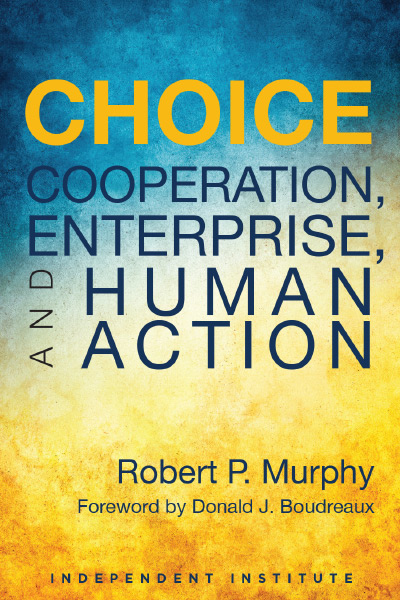Ep. 413 The Primacy of Choice in Economics, Theology, Physics, and Even Math

Bob explains the fundamental role that subjective choice plays in various fields, suggesting there is something quite extraordinary about it.
Mentioned in the Episode and Other Links of Interest:
- Bob’s book Choice. A recent Human Action podcast episode with Jonathan Newman, discussing Bob’s introductory textbook and why action is so important in economic science.
- BMS ep. 304, the first installment of the Bible commentary, which includes Bob’s movie theater analogy for reconciling free will and determinism.
- BMS ep. 257 laying out Hans Hoppe’s case that Mises’ action axiom solved the mind-body problem.
- A good YT video explaining the weird results of the 2-slit experiment.
- A good YT on Bell’s Theorem. Sabin Hossenfelder on Hoofdt and superdeterminism.
- InFi ep. 22 featuring Michael Fraser, who consults with business leaders that they should view AI as a cauldron, not a crystal ball.
- Background info on the Axiom of Choice from set theory.
- Help support the Bob Murphy Show.

I know it wasn’t an important part of your point but I must take issue with saying that free will solves the problem of evil. There are many examples of unnecessary suffering in the world that don’t involve any human choosing to do evil, and those are the ones that Christianity can’t explain.
Re: Freeman Dyson’s attempt to salvage free will by saying the subatomic particles have it and it bubbles up – I don’t see how this makes sense. If it’s the electrons choosing, then it’s not me. I’m just along for the ride. Also, if it were a choice, we would not expect them to follow exact probabilities, but they do follow them.
I don’t think shoe example quite works, and quantum entanglement really is important here. The whole point is that the choice is completely random and not known to anyone beforehand. But if you use shoe arrangements, the guy who set the shoes up knows how they are arranged beforehand. And the ship captains can’t randomly mix the shoes up themselves because then they would not land on the same attack vector.
Hi Dave,
Yes I agree, I was too harsh on myself in thinking the shoe example blows up my proposal. And I get what you’re saying about quantum uncertainty and free will; I think most physicists would agree with you. On evil, I understand what you’re saying but here my stance is a standard one.
The quantum mechanic probabilities just average out to classic physics at the macro level so it really doesn’t make sense to argue that because electrons have free will therefore we do, and it’s in addition to Dave’s point that we are not the “free will” electrons.
Also, we really need to stop talking about “observer” in quantum mechanics, that is not at all what’s implied here, what scientists really mean is “measurement.” Performing a measurement collapses the wave function, the reason why the measurement does that is because we use quantum particles to measure quantum particules we have nothing else to measure. We should an electron or a photon, it interacts with the wave that we’re measuring collapsing its way function giving us back the info. When the electron hits the fluorescent screen in the two slit experiment, it interacts with a particle on that screen and its way function collapses emitting the energy of the collision back as light. Nothing to do with humans or a will looking at it.
But more importantly, I find this debate between determinism and free will completely ridiculous. We have scientist, philosophers, and theologians debating over free will attempting to prove or disprove that there is something specific to humans that is completely detached from the material world and yet interacts with it through human nervous systems. That’s silly. The whole idea of free will isn’t that you make choices independently of the material world, it’s an emergent property of the brain and the mind, the part of your mind that makes the choice is influenced by incentives, the material world, and your memory rather than just being something independent of the world.
Danny Duchamp I think explained it best: https://youtu.be/Hn_PuzVU9ls?si=4sos9inucH-xi9nA
I’ll check out the video, Remy, but you seem to be simply asserting one particular view of free will. If you’re right, then what evolutionary advantage does this emergent property confer?
It is a mistake to think that every trait we see must have been evolutionarily beneficial for it to be present. Plenty of traits are detrimental but simply ride along with other traits that are beneficial and the net effect is still a benefit.
If consciousness/sentience/free will/whatever is merely an emergent property of a very complex brain, then it doesn’t need an evolutionary explanation. The complex brain needs one – but I think it’s fairly obvious why a complex brain would confer an advantage.
All this stuff just breaks my brain. I’m with Einstein. We’re missing something.